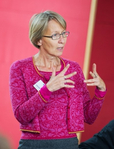Equal Opportunities


PI: Univ.-Prof. Dr. Carmen Leicht-Scholten, Gender and Diversity in Engineering (GDI)
SFB researchers: Sebastian Bernhard, M.A., Gender an Diversity in Engineering (GDI)
From a theoretical and methodological perspective of Science and Technology and Gender Studies, the GDI investigates complex structures of technical research organizations to implement a tailor-made and research-based diversity management approach within the subproject “Equal Opportunities” of the SFB1394.
To support the sustainable development of technology and society, our central task is to develop a system-theoretical approach that enables the anchoring of our diversity management approach in the organisational reality, culture, and structure of the SFB1394.
Accordingly, we apply social science methods and mechanisms of change management that are human-centred and diversity-sensitive. Thereby, we develop a tailor-made strategy in participative collaboration with the members of the SFB. This strategy combines extensive literature reviews, qualitative and quantitative research, panel discussions, and workshops according to the special needs of the members of the organization, based on the research.

Publications:
[1] S. Bernhard and C. Leicht-Scholten, (in Press) Gendering and Transforming Engineering Education - A Philosophical Perspective on the Gendered Limits of Choice, in Questioning Gender Politics: Contextualising the Future of Education and Schooling in Uncertain Times, J. Bustillos Morales, Ed., London: Routledge.
[2] L. Steuer-Dankert and C. Leicht-Scholten, (2022) Perceiving diversity - an explorative approach in a complex research organization, Diversity and Discrimination in Research Organizations, pp. 365–392, doi: 10.1108/978-1-80117-956-020221010/FULL/EPUB.
[3] C. Leicht-Scholten, M. Sharma, W. Bleck, and L. Steuer-Dankert, (2017) Diversity and Innovation Management in Large Research Groups,” International Journal of Innovation Management, vol. 5, p. 49/72.
[4] C. Leicht-Scholten, (2022) The Gender Blind Spot: Reflections on the German Discourse on Gender, Work, and Digitalization—Work 4.0,” Handbook Industry 4.0: Law, Technology, Society, pp. 1041–1062, doi: 10.1007/978-3-662-64448-5_54/FIGURES/3.
[5] C. Leicht-Scholten, (2018) Sozial verantwortliche Technikwissenschaften: der Beitrag der Geschlechterforschung für Forschung, Entwicklung und Ausbildung,” Handbuch Interdisziplinäre Geschlechterforschung, pp. 1–9, doi: 10.1007/978-3-658-12500-4_140-1.
[6] C. Leicht-Scholten, E. Breuer, N. Tulodetzki, and A. Wolffram, (2011) Going Diverse: Innovative Answers to Future Challenges,” Going Diverse: Innovative Answers to Future Challenges, doi: 10.2307/J.CTVHHHH3G.
[7] J. Bosen, S. Bernhard, E. Fauster, M. Decker, M. Lämmerhirt, and C. Leicht-Scholten, (2023) Engineering Society: The Role Of Intersectional Gender And Diversity Studies For A Sustainable Transformation On The Case Of Interdisciplinary Engineering Education,” Practice Papers, doi: doi.org/10.21427/Q05K-AW70.
[8] C. Leicht-Scholten, (2007) »Gender and Science« - Perspektiven in den Natur- und Ingenieurwissenschaften,” transcript Verlag.


